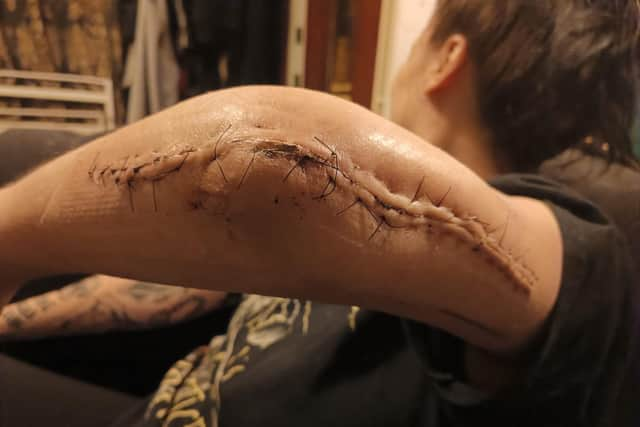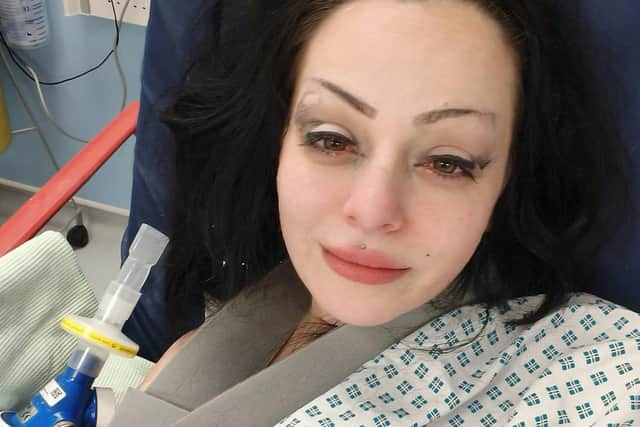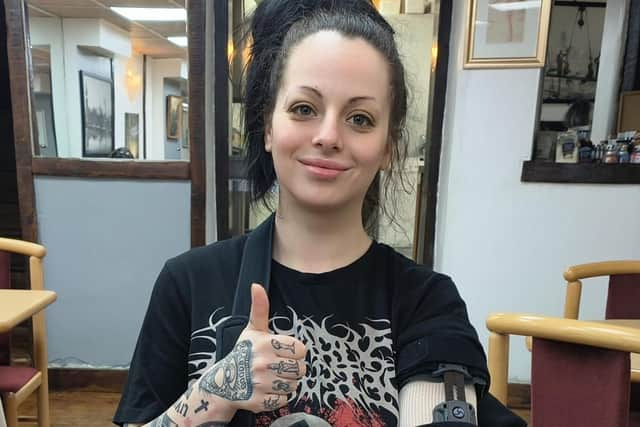Banbury woman makes major complaint over 'horror movie' hospital care at the Horton and JR
and live on Freeview channel 276
Sharne Carr – a former NHS midwifery assistant and biomedical scientist - described being denied appropriate painkillers, lack of belief in her condition, lack of proper nursing care and neglect of vulnerable patients.
Ms Carr had no family visitors to help, while in extreme pain before and after surgery for a broken elbow, because her partner had to care for her two disabled children.
Advertisement
Advertisement
She said: “The main issue is lack of compassion and not listening to patients who are seen as a ‘thing’ to tick off and move on from. The quickest way (to discharge) is what they go with.


“Staff appear to lack any knowledge of whistleblowing procedures, safeguarding or dementia care, which they are trained in. They either illegally did not receive this training or did not follow it.
“It was traumatising. It felt like a horror movie. The staff's behaviours were completely unacceptable and their willingness to abuse their positions of power was horrific.”
Ms Carr’s ordeal began last December 16 when she fell badly on ice.
Advertisement
Advertisement
"My elbow snapped backward entirely – the radiologist said it was one of the worst breaks of its kind that he had seen,” she said.


She sustained excruciatingly painful nerve damage, requiring a specific kind of painkiller – gabapentin. She realised what was wrong but her pain level was not believed and she was told to ‘put up with the pain’ by Horton staff. She was given opioids which are not effective for nerve pain.
She had to wait for two nights for transfer to the JR, Oxford because of a shortage of beds. There she ended up helping patients who had had pelvic or hip operations to go to the toilet. Buzzers were not responded to. Some patients had to wet themselves.
"This continued at night and I have videos of staff sitting playing on their phones,” she said.
Advertisement
Advertisement
Ms Carr made video recordings as evidence, one of a 100-year-old patient with dementia being fed.


"The nurse spoke to her in a nasty tone of voice and got increasingly frustrated because she was having difficulty. Another time she was placed in a chair first thing in the morning.
"She was slumped over with her breasts on show because her hospital gown had slipped down. I and other visitors in the room had to keep covering her dignity and no matter how many complaints were made, she was left like that until lunchtime.
"Every night staff were rude, abrupt, dismissive and on occasion would ignore patients completely - even when they were pleading for help.
Advertisement
Advertisement
"Call buzzers were ignored for even longer than at the Horton. Patients were being left on commodes for up to 45 minutes - shouting for help.
"Drug rounds were nowhere near on time. Four-hourly doses were more like eight hourly doses - after patients had to request it several times - myself included. It was chaos and it certainly didn't feel like a safe environment to be having surgery or to be recovering in.”
Ms Carr’s planned three-hour operation took over five hours, such was the complexity of the break.
“Back on the ward I was still in ridiculous amounts of pain. I was connected to a morphine pump but opioids are not suitable for nerve pain. I was being unnecessarily pumped with opioids - no matter how much I raised concern.
Advertisement
Advertisement
“On December 20 my catheter bag was completely full. No one had emptied it since surgery. I was still connected to an observations machine which hadn't been monitored consistently overnight despite me being tachy (rapid heart beat) and having low oxygen levels.”
Ms Carr said one nurse put her on oxygen but another dismissed this ten minutes later and switched off the oxygen at the wall.
“I had to remove my own catheter bag. I wrote down my own observations to give to the day staff. Then I had to untangle myself, manoeuvre around the bed, turn the oxygen back on and wait for my levels to go back to normal."
"After spending four days being dismissed and ignored, I knew I would need evidence for PALS and Care Quality Commission. I decided to record evidence for the safety of other patients and myself.
Advertisement
Advertisement
“On December 21 I had to remove my own cannula which was showing signs of infection. Several staff members said they would remove it but would all disappear.”
Ms Carr had concerns about another patient, left on a commode, crying for help but unattended, in a ward with no heating working. Patients’ families were bringing in thick duvets.
“There were staff members all over the ward chatting about non-work-related things and ignoring (this lady).
“I genuinely feared for my safety and the sanity of myself and the other patients. The treatment had gone past negligence and become serious abuse,” she said.
Advertisement
Advertisement
Her complaint reports finding unwrapped pills on the floor of the ward and being given the wrong medication.
Ms Carr discovered she had textbook symptoms for radial nerve palsy. Staff refused to accept her diagnosis but it was confirmed after her discharge.
She was discharged on Christmas Eve without transport to return her to Banbury. Her grandmother reported being told: ‘it's her arm that is broken. Her legs work so she can use them’.
She still had no pain relief and her dressing had not been changed. Her discharge papers confirmed that indeed there was nerve damage which needed treatment with suitable pain relief. It incorrectly said she had no mobility, continence, eating and drinking, or washing and dressing issues.
Advertisement
Advertisement
Sam Foster, Chief Nursing Officer at OUH, said: “We take all concerns raised patient care in our hospitals very seriously – patient safety and providing excellent care are of the utmost importance to us.
“We are currently looking into this complaint and will then respond.”